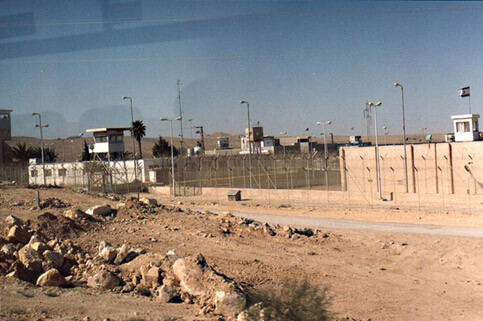Mandela Institute 31 August 2004

In Nafha prison (pictured above) prisoners boycott the prison clinic.
In an interview with advocate Buthaina Duqmaq, Abdul-Salam Shukry and Mohmoud Haskour, two Palestinian prisoners, affirmed inmates at Nafha Prison have high spirits and vow to continue the hunger strike until their humanitarian and just demands are realized. They asserted any deal between the prisoners and the Israeli prison authorities must be concluded only with prisoners’ leadership. Israeli military authorities have scattered prison leaders among several isolation sections to create a wedge among inmates.
Advocate Duqmaq learned that several infirm cases were reported at Nafha Prison. The administration had forced two infirm prisoners into signing an undertaking which states: “We are solely responsible for our safety and wellbeing should we continue the hunger strike”. The infirm prisoners are Issa Shabaneh who suffers cardiac problems and Issa Jabarin who was diagnosed with renal problems. Ms. Duqmaq indicated Fahmy Mashahra and Abdul-Halim Abdullah were among 4 infirm cases that were transferred to hospital. Both had stomach disorders and were vomiting blood. In protest, inmates decided to boycott the prison clinic since 26 August 2004. The administration tried to distribute vitamins on 30 August 2004 but the prisoners refused taking them.
Additionally, inmates complained about ill treatment and physical violence perpetrated against them by Israeli soldiers especially during transfer to and from military courts. They also complained about the humiliating strip search and their locking up in temporary detention stations up to four days under harsh circumstances. Prisoners protested the provocative arbitrary daily search of their cells despite the fact that prison authorities had confiscated all personal effects on the first day of the hunger strike.
The Nafha Prison administration conducted a series of transfers between prisons whereby it transferred 50 inmates to Ashqelon and brought 50 inmates from Ashqelon and Ha Liqdar to Nafha. The administration also designated a special room for common criminal inmates who were brought in from other sections or prisons to torment striking prisoners.
Related Links